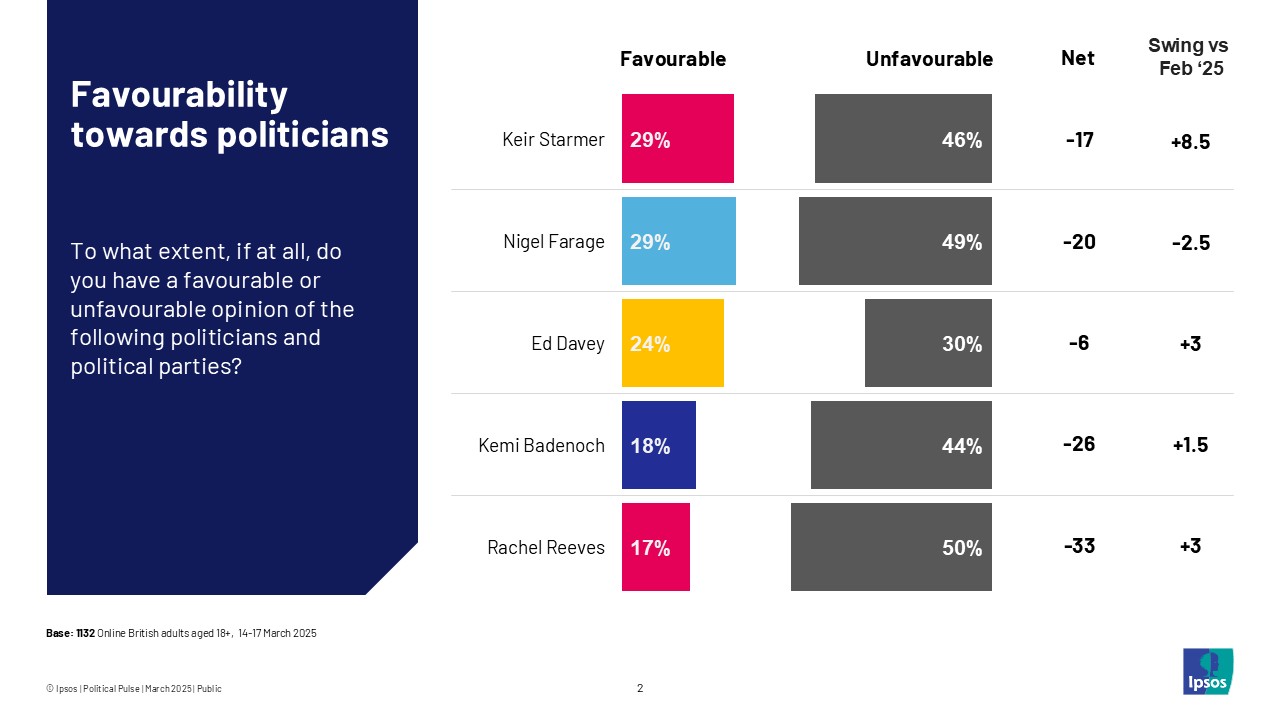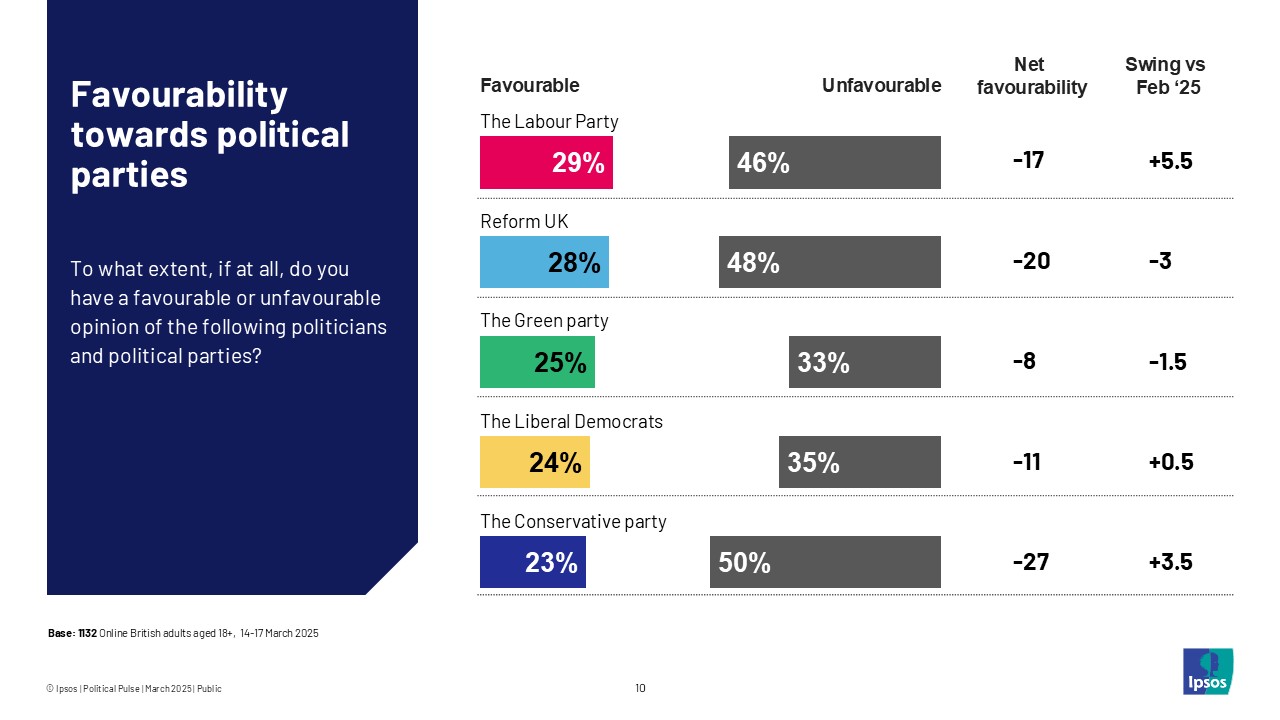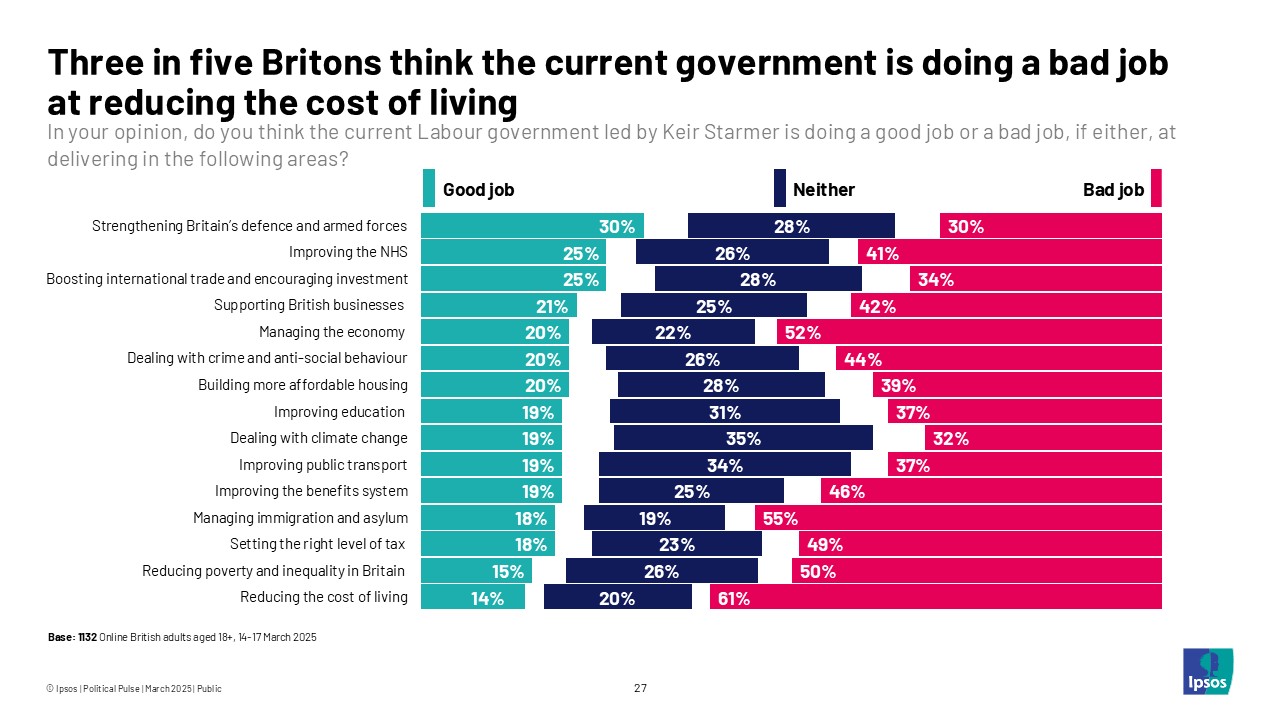Boost for Keir Starmer as ratings improve - but public think his government are doing a poor job on issues that matter most
The latest edition of the Ipsos Political Pulse survey, taken between the 14th and 17th of March, looks at public opinion towards several key political figures and issues facing the country.
Keir Starmer sees boost in approval ratings

- 29% of Britons have a favourable view of Prime Minister Keir Starmer, up from 21% last month. However, 46% are unfavourable, giving him a net approval rating of -17.
- The same percentage (29%) hold a favourable opinion of Reform UK leader Nigel Farage. However, a slightly higher proportion (49%) are unfavourable, giving him a net favourability rating of -20.
- Just 17% of Britons hold a favourable view of Chancellor Rachel Reeves. Half (50%) are unfavourable, giving her a net favourability rating of -33.
- Leader of the opposition Kemi Badenoch holds a rating of -26, with 18% favourable and 44% unfavourable.
- Around a quarter (24%) hold a favourable view of Liberal Democrat leader Ed Davey, while 30% are unfavourable (net -6).
- Beyond Westminster, around two in ten (21%) Britons hold a favourable view of US President Donald Trump, with 64% unfavourable (net -43).
- Vice President JD Vance’s approval ratings are similarly low, with 14% favourable and 58% unfavourable (-44).
- When asked who would make the better Prime Minister in a head-to-head contest, Keir Starmer continues to lead both Kemi Badenoch (33% vs 16%) and Nigel Farage (36% vs. 25%).

- The Labour Party has also seen a boost in approval ratings over the past month. Around three in ten (29%) are favourable towards the party of government, up from a quarter (24%) last month. 46% are unfavourable (-6), giving a net favourability rating of -17.
- Once again, the Conservative party continues to hold the lowest net favourability rating of any party polled at -27, though there has been a slight improvement from February. 23% express a favourable view of the party (up from 19% last month), with 50% unfavourable.
- Conversely, the Green party has the highest net favourability rating at -8. 25% are favourable towards the party, while a third (33%) are unfavourable.
- The Liberal Democrats sit at -11. 24% express a favourable view and 35% unfavourable.
- Reform UK’s favourability ratings have declined since last month, with a net rating of -20 (up from -14 last month). 28% hold a favourable view of the party, with 48% unfavourable.
Government performance
- 21% think the country is heading in the right direction (+6), and 53% say wrong direction (-9). This is still a net negative rating of -32 but has improved from last month.
- When asked to score the government’s performance on a scale of 1-10, the mean score overall is 4.0 (up from 3.5 in February).
- 36% of voters say that they are considering voting Labour at the last election, up 5 ppts from last month. One third (33%) each say that they are considering voting for Reform UK and the Liberal Democrats, followed by 31% who are considering voting Conservative and 28% who are considering voting for the Green Party.
Key issues
- Across the political spectrum, healthcare/the NHS/hospitals (61%), inflation/the cost of living (50%) and immigration (44%) continue to be the most important issues for voters, followed by managing the economy (38%).
- The Labour government is in net negative for performance on all of these issues, with majority saying they are doing a bad job on the cost of living (61%), immigration (55%), and managing the economy (52%).

Keiran Pedley, Director of UK Politics at Ipsos said:
These poll findings offer some good news for Keir Starmer and Labour following declining poll ratings over recent months. Starmer’s favourability ratings have improved and he is still clearly preferred as Prime Minister compared to the two most likely candidates to replace him. However, his government is still seen as doing a bad job on some of the issues that matter most to voters. Reflecting that although the public are more likely to think the country is moving in the right direction than last month, a majority still think things are heading the wrong way.
Technical note:
- Ipsos interviewed a representative sample of 1,132 adults aged 18+ across Great Britain. Interviews were conducted online between the 14th-17th March 2025.
- Data are weighted to match the profile of the population. All polls are subject to a wide range of potential sources of error.




